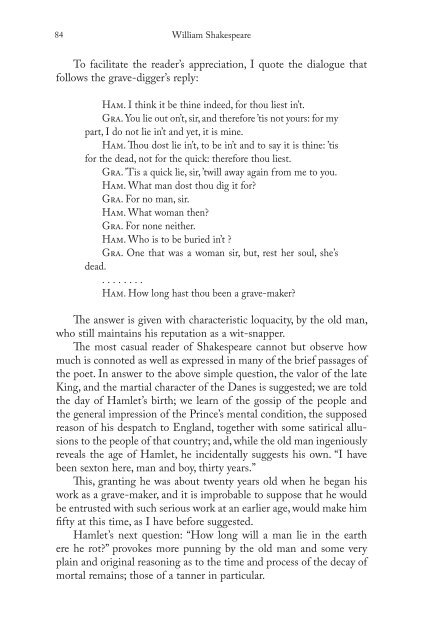Blooms Literary Themes - THE TRICKSTER.pdf - ymerleksi - home
Blooms Literary Themes - THE TRICKSTER.pdf - ymerleksi - home
Blooms Literary Themes - THE TRICKSTER.pdf - ymerleksi - home
Create successful ePaper yourself
Turn your PDF publications into a flip-book with our unique Google optimized e-Paper software.
84<br />
William Shakespeare<br />
To facilitate the reader’s appreciation, I quote the dialogue that<br />
follows the grave-digger’s reply:<br />
Ham. I think it be thine indeed, for thou liest in’t.<br />
Gra. You lie out on’t, sir, and therefore ’tis not yours: for my<br />
part, I do not lie in’t and yet, it is mine.<br />
Ham. Th ou dost lie in’t, to be in’t and to say it is thine: ’tis<br />
for the dead, not for the quick: therefore thou liest.<br />
Gra. ’Tis a quick lie, sir, ’twill away again from me to you.<br />
Ham. What man dost thou dig it for?<br />
Gra. For no man, sir.<br />
Ham. What woman then?<br />
Gra. For none neither.<br />
Ham. Who is to be buried in’t ?<br />
Gra. One that was a woman sir, but, rest her soul, she’s<br />
dead.<br />
. . . . . . . .<br />
Ham. How long hast thou been a grave-maker?<br />
Th e answer is given with characteristic loquacity, by the old man,<br />
who still maintains his reputation as a wit-snapper.<br />
Th e most casual reader of Shakespeare cannot but observe how<br />
much is connoted as well as expressed in many of the brief passages of<br />
the poet. In answer to the above simple question, the valor of the late<br />
King, and the martial character of the Danes is suggested; we are told<br />
the day of Hamlet’s birth; we learn of the gossip of the people and<br />
the general impression of the Prince’s mental condition, the supposed<br />
reason of his despatch to England, together with some satirical allusions<br />
to the people of that country; and, while the old man ingeniously<br />
reveals the age of Hamlet, he incidentally suggests his own. “I have<br />
been sexton here, man and boy, thirty years.”<br />
Th is, granting he was about twenty years old when he began his<br />
work as a grave-maker, and it is improbable to suppose that he would<br />
be entrusted with such serious work at an earlier age, would make him<br />
fi fty at this time, as I have before suggested.<br />
Hamlet’s next question: “How long will a man lie in the earth<br />
ere he rot?” provokes more punning by the old man and some very<br />
plain and original reasoning as to the time and process of the decay of<br />
mortal remains; those of a tanner in particular.

















